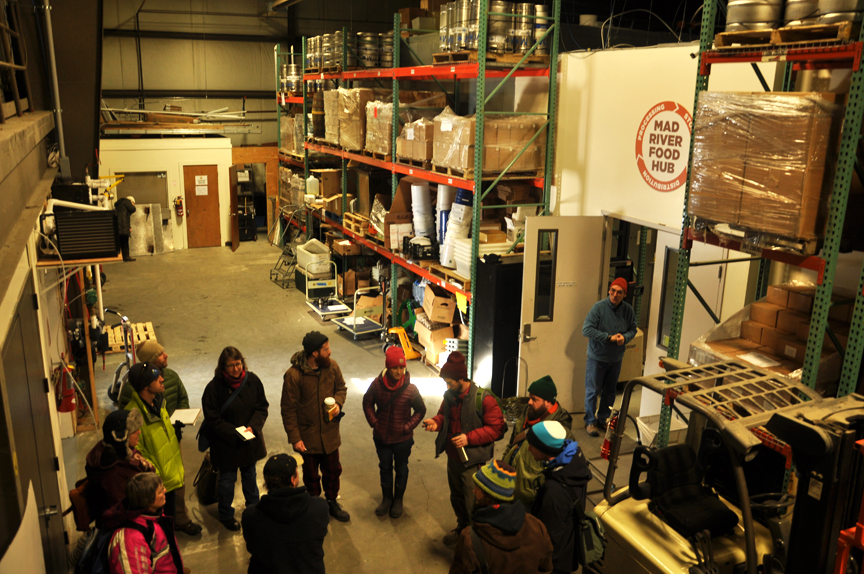by Mariette Landry
Five years ago, UVM Food Hub Management program graduate Lisa Reeder worked part-time to provide sales, purchasing, and warehouse support at Local Food Hub in Charlottesville, Va. From there, she moved on to Grower Services and Purchasing, and in 2013, she became Local Food Hub’s Value Chain Coordinator. In this role, Reeder works to preserve and enhance the value of the food from farm to table and to ensure that each link in the supply chain invests in a high-quality, localized food supply.
In addition to her work at Local Food Hub, Reeder is currently serving as a Teaching Assistant in the Food Hub Management program at UVM. We asked her to tell us about some of the rewards and challenges of “pushing the boundaries of local.”
When you enrolled in the Food Hub Management program at UVM, what was your background, and why did you take the course?
I have an extensive background in food service, chef’s training, and several years under my belt in an operational role at Local Food Hub. I enrolled in the UVM program in order to broaden my own vision for local food. I wanted to extend it to include other region’s local food systems, in the hopes of learning about the common challenges and diverse solutions to a few persistent, troubling questions, like farm viability, wholesale market forces, and education and paradigm shifts around cooking and eating.
How did your fellow students educate and inspire you throughout the program?
During our first residency in January 2015, we sat in a circle to introduce ourselves, our organizations, and to give ‘big questions’ that we were hoping to work on during the program. There were a lot of sighs of relief as we each heard our hopes and our challenges emerge from others’ mouths!
Throughout the online coursework, we continued to support and challenge each other by offering differing viewpoints, resources from our own work, and introductions to other practitioners with similar challenges and potential solutions.
In addition to your work at Local Food Hub in Virginia, you’re also working as a Teaching Assistant in UVM’s Food Hub Management program. What does a typical day look like for you?
For the 2016 program, I’m currently working two to four hours per week to refine the class based on my experience as a student.
Along with lead faculty members Ann Karlen and Susie Walsh-Daloz, and based on input from practitioners and subject-matter experts who actually teach the modules, I want to emphasize establishing context and common ground across diverse types of hubs.
Every food region is unique in growing season and climate conditions, not to mention that Food Hubs are diverse in legal structures, financial models, and operational scope. I am revisiting the content and fine-tuning it in the hopes that we provide context, instruction, and support for the full range of student experience levels.
What’s happening at your organization that’s pushing the boundaries of local, and how do you share that with your colleagues across the country and your students at UVM?
Local Food Hub is a nonprofit that is six years old and has grown very quickly, so our physical boundaries are expanding every year, and we have to hustle to stick to our mission and keep our message relevant and accurate.
As a nonprofit, we have to find the balance between investing in operational growth and programmatic growth and make certain that our decisions are expanding food access and bolstering small farms’ viability.
Because of the yearly seasonal cycle, I try to focus on what is a logical step for the coming year—what can we do the next time around? Is it trying out new packaging, or test marketing a new product by distributing samples?
As I pass my five-year mark with this organization, I try to remind myself daily that sustainable change is not found in a spreadsheet or online; sustainable change depends on people and our evolving relationships with one another and with food.
What are some resources for people interested in creating a food hub in their area? Any advice for getting started?
The National Good Food Network (NGFN) coordinates a number of excellent resources, including a monthly newsletter, listserve for food hub practitioners, and webinar series, all based on input from numerous Study Hubs and practitioners across the country.
In terms of starting food hubs, every community has to look at the stakeholder groups that are willing to collaborate on a better solution for local food production and consumption. This must include farmers. An accurate picture of community needs and existing projects is a good starting point. And it’s imperative that these projects not rest on any single person or group’s shoulders. While individual leadership is crucial, success brings growth, and the workload quickly outpaces what an individual is capable of, so collaboration needs to be part of the solution from the very beginning.
Mariette Landry is a freelance writer and editor for UVM Continuing and Distance Education.












